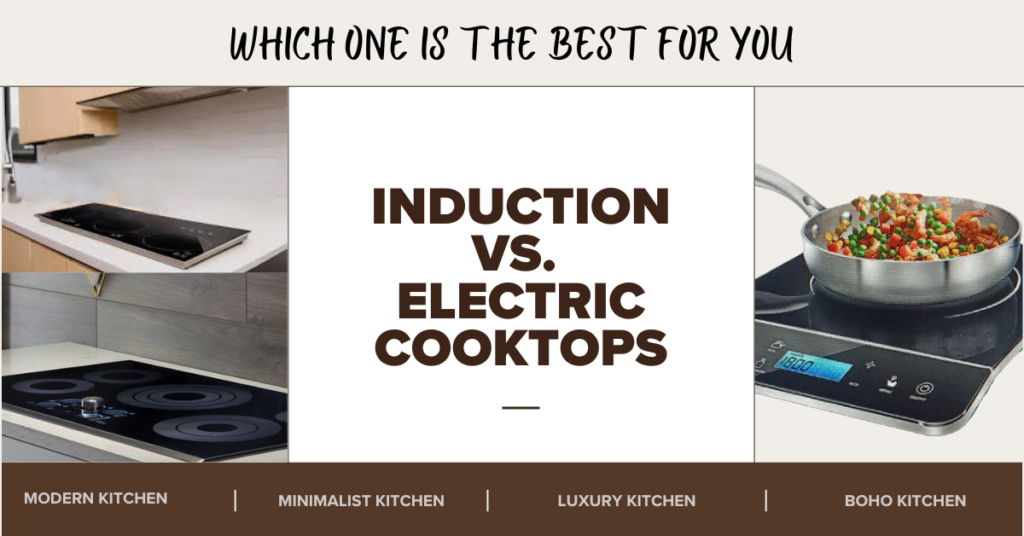Induction vs. Electric Cooktops: How to Pick the Right Cooktop:7 Strong Reasons

The main attraction of the kitchen is the cooktop and its selection. Induction vs. Electric Cooktops at first glance, you might not notice much difference between them. Both have unique advantages and potential drawbacks, making it essential to understand their differences before making a purchase. In this article, we’ll explore the essential factors to consider when choosing between an induction cooktop and an electric cooktop.
1. Induction vs. Electric Cooktops : How They Work: Understanding the Basics
Induction Cooktops: Induction Induction cooktops use magnets to heat up your pots and pans directly. When a compatible pot or pan is placed on the cooktop, the magnetic field induces currents within the cookware, generating heat. This method ensures that only the cookware and its contents get hot, while the cooktop surface remains cool to the touch.
Electric Cooktops: on the other hand, Electric cooktops, use electrical resistance to generate heat. These cooktops have either coil burners or smooth, flat surfaces with embedded heating elements. The cookware is heated through direct contact with the heated surface.
2. Induction vs. Electric Cooktops : Their Efficiency: Power Consumption and Cooking Speed
Induction Cooktops: Induction cooktops are known for their superior energy efficiency. Because heat is produced directly in the cookware, minimal heat is lost, leading to quicker cooking times and reduced energy consumption. On average, induction cooktops can be up to 90% efficient.
Electric Cooktops: Electric cooktops are less efficient compared to induction. They typically have an efficiency rate of around 70-75%, as some energy is lost in heating the cooktop surface and the surrounding air. Cooking times are generally longer as well.
3. Induction vs. Electric Cooktops : Which one Costly: Initial Investment and Long-Term Savings
Induction Cooktops: Induction cooktops are generally more expensive upfront, with prices ranging from $500 to $2,500 (INR 40,000 to INR 200,000). However, their energy efficiency can lead to savings on electricity bills over time.
Electric Cooktops: Electric cooktops are more budget-friendly, with prices starting as low as $200 and going up to $1,500 (INR 16,000 to INR 120,000). They offer a lower initial investment, but long-term energy costs may be higher compared to induction cooktops.
4. Induction vs. Electric Cooktops : Their Safety: Which Option is Safer for Your Home?
Induction Cooktops: Induction cooktops are considered very safe because the surface remains cool to the touch, reducing the risk of burns. Additionally, they often come with safety features like auto shut-off when no cookware is detected.
Electric Cooktops: Electric cooktops can pose a higher burn risk as the surface remains hot after cooking. However, modern electric cooktops often include safety features like residual heat indicators to warn users.
5. Induction vs. Electric Cooktops : Ease of Cleaning: Hassle-Free Maintenance
Induction Cooktops: The smooth, flat surface of induction cooktops makes them easy to clean. Since the cooktop itself doesn’t get hot, spills and splatters won’t burn onto the surface, allowing for quick and easy wiping.
Electric Cooktops: Smooth-top electric cooktops are also relatively easy to clean, but spills can burn onto the surface, requiring more effort to remove. Coil-type electric cooktops can be more challenging to maintain, as food debris can get trapped under the coils.
6. Induction vs. Electric Cooktops : Cookware Compatibility: What Do You Need?
Induction Cooktops: Induction cooktops require compatible cookware made of magnetic materials like cast iron or certain stainless steels. If your current pots and pans are not induction-compatible, you may need to invest in new induction cookware.
Electric Cooktops: Electric cooktops work with a wide variety of cookware, including non-magnetic materials like aluminum and copper, making them more versatile in this regard.
7. Induction vs. Electric Cooktops : Environmental Impact: Going Green
Induction Cooktops: Due to their high efficiency and lower energy consumption, induction cooktops have a smaller environmental footprint. They reduce the amount of wasted energy and contribute to lower greenhouse gas emissions.
Electric Cooktops: While electric cooktops are less efficient, they are still a greener option compared to gas cooktops. However, their higher energy consumption does mean a larger environmental impact compared to induction cooktops.
Final Verdict: Induction vs. Electric Cooktops : Which Cooktop is Right for You?
When choosing between an induction and an electric cooktop, consider your budget, cooking habits, and kitchen setup. If energy efficiency, safety, and fast cooking times are top priorities, an induction cooktop is a smart choice. However, if you’re looking for a more affordable option with greater cookware compatibility, an electric cooktop might be the better fit.
In summary, both induction and electric cooktop have their merits. The right choice depends on your specific needs and preferences, ensuring you’ll enjoy your time in the kitchen with the cooktop that best suits your lifestyle.


